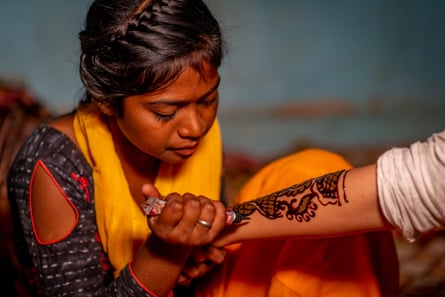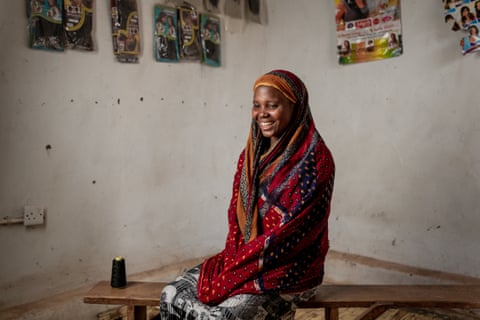Twelve million girls are married every year before they reach 18, according to UN estimates. And in its first set of global statistics on child marriage rates among boys, the UN found one in 30 young men were married as children.
Advances have been made, however. Ending child marriage by 2030 is a target in the UN’s set of sustainable development goals, and many countries have launched strategies to stop the practice. But progress is slow and likely to be badly affected by the coronavirus pandemic as closed schools and financial pressures take their toll on families. In April, the United Nations Population Fund predicted that an additional 13 million children could be married over the next decade because of disruption to programmes.
But some girls and women are taking matters into their own hands and campaigning for change where they live. The girls who speak here were photographed in collaboration with the London-based NGO Girls Not Brides – an international network of more than 1,400 civil society organisations working to end child marriage and enable girls to fulfil their potential.

Ruby, 16 – Nepal
When she was 15, a man asked Ruby’s parents for permission to marry their daughter. In Nepal, about 40% of girls are married before they turn 18, and most marriages are arranged by family members.
But Ruby knew that girls in Nepal can’t legally be married until they reach 20. With support from Janaki Women’s Awareness Society, based in Dhanusha, south of Kathmandu, which educates girls on their rights, she was able to persuade her parents to turn the proposal down.
“I will get married after I’m 20. I want to learn to use a sewing machine. And then I want to open a big tailoring shop in the market, stitch clothes and earn my own money. I’ll stitch lehenga, suits, dresses and shirts. I like good embroidery designs and pearls.”


Ruby making a henna pattern and with friends
Ruby is encouraging her friends to do the same.
“I told all my friends to study. To learn some skills to be independent and then get married. If you get married now, you will have children and life will be difficult.”

Suci, 19 – Indonesia
Suci began her campaign against child marriage by going door-to-door asking people to sign a petition. “But we wanted to do something bigger, so we decided to take our campaign on to the streets. We made a banner and marched through the village, telling people why child marriage needs to stop.”
Suci’s drive to end child marriage began when her brother married a girl who was 15. She saw the difficulties the girl faced. Suci now leads a child protection group in her village in Lombok. She has visited Bangkok and Jakarta to speak about her work.
About 14% of girls in Indonesia are married before 18, and the practice is common in rural areas. Poverty and gender inequality are the main drivers.

Jenina, 23 – Kenya
Jenina was married when she was 13. She lived with her in-laws, but because she did not get pregnant, they made life difficult for her and eventually she ran away.
She is now back living with her parents, who are supporting her because they saw her much she suffered through the marriage.
Jenina, who is from the Samburu community in northern Kenya, wishes she had refused to get married and told her parents she wanted to finish school. But she’s using her experience to warn other girls.

Ghazal*, 18 – Lebanon
When Ghazal was told she would be married, her first thought was: “I will wear a white dress and have a home and children. I can have the nice house I used to dream about in Syria.” She was 13 at the time. The man she married was 19.
Three years earlier, Ghazal’s father was killed in the Syrian conflict. Weeks later, Ghazal’s mother took her and her three sisters across the border to Lebanon.
She met her future husband after it was decided she would marry. “Three months later, I fell pregnant with our first child, Hana. And two months after she was born, our second child, Abas, was on the way,” Ghazal explains.
Abas is now three, and Ghazal is still married to Khalid. Through the International Rescue Committee in Lebanon, she learned about reproductive health, decision-making in the home and how to maintain a healthy relationship.


Ghazal’s kitchen and with her family in Lebanon
“There are difficulties that we’re overcoming,” says Ghazal, with her son in her arms. “We’re not stable. We stay for two months in a house and then we move. We don’t know if we will go back to Syria. If we go back, they will take my husband immediately.” Khalid’s father was killed by the Syrian government.
Ghazal is determined to stop her sister getting married so young. And, with the support of Khalid, will not let her daughter become a child bride.

Yelina, 20 – Malawi
Yelina almost got married when she was 17. A refugee from the Democratic Republic of the Congo, she was living in Dzaleka refugee camp in central Malawi with her father and stepmother. Yelina’s mother abandoned her as a child after she separated from her father.
But she wasn’t getting on with her family. “My stepmother doesn’t want me there. She doesn’t treat me well. I thought that getting married would be a way to get away. It was the only choice I had left.”
But then Yelina heard about the refugee-led organisation Solidarity of Refugee Women for the Social Welfare (Soferes) based in Dzaleka, which provides vocational training for girls at risk of child marriage.
She took a hairdressing course and is now working at the small salon the organisation runs in the camp.
“The money I get from this work, I use for my own needs and for the needs of my family,” Yelina says. The work has helped her cope with family life and given her options.
“If there is someone hearing what I’m saying now, I would suggest to them to study rather than getting married.”
* Name changed
